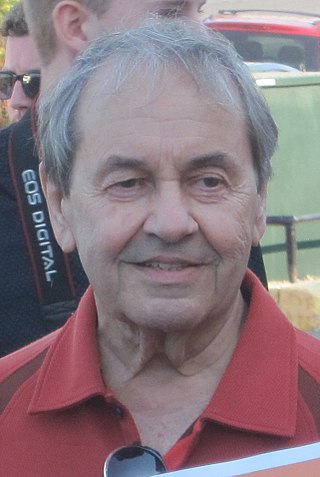Andrew S. Brandt was a Canadian politician and public administrator who served in a number of roles in the province of Ontario. He served in the Legislative Assembly of Ontario as a Progressive Conservative from 1981 to 1990, and was a cabinet minister in the governments of Bill Davis and Frank Miller. He later served as interim leader of the Progressive Conservative Party from 1987 to 1990 before being appointed chairman and CEO of the Liquor Control Board of Ontario.
Murray John Elston is a former politician in Ontario Canada. He was a Liberal member of the Legislative Assembly of Ontario from 1981 to 1994 who represented the central Ontario ridings of Huron—Bruce and Bruce. He was a senior cabinet minister in the government of David Peterson. He briefly served as interim leader of the Liberal Party from July to November 1991.

John R. Rodriguez was a Canadian politician. He served as the mayor of Greater Sudbury, Ontario from 2006 to 2010 and previously represented the electoral district of Nickel Belt in the House of Commons of Canada from 1972 to 1980 and from 1984 to 1993 as a member of the New Democratic Party.
Phyllis Marion Boyd was a Canadian politician in Ontario. She was a New Democratic member of the Legislative Assembly of Ontario from 1990 to 1999 who represented the riding of London Centre. She served as a member of cabinet in the government of Bob Rae.
Keith Calder Norton was a Canadian politician and public servant. He served as a Progressive Conservative member of the Legislative Assembly of Ontario from 1975 to 1985, and was until 2005 the chief commissioner of the Ontario Human Rights Commission.
Dave Cooke is a former politician in Ontario, Canada. He was an NDP member of the provincial legislature from 1977 to 1997, and was a senior cabinet minister in the government of Bob Rae.

Howard Moscoe is a former city councillor in Toronto, Ontario, Canada, representing Ward 15 in the western part of Eglinton-Lawrence. Among the most prominent and longest-serving councillors in the city, he is also known for an outspokenness which caused controversy at times. Moscoe is a member of the New Democratic Party. On August 31, 2010, after 31 years as an elected municipal politician, Moscoe announced his retirement from city council.
Michael Liam Farnan was an Irish-born Canadian politician. He was a Ontario New Democratic Party member of the Legislative Assembly of Ontario from 1987 to 1995, and served as a cabinet minister in the government of Bob Rae.
Brian Albert Charlton is a former politician in Ontario, Canada. He was a New Democratic member of the Legislative Assembly of Ontario from 1977 to 1995 who represented the riding of Hamilton Mountain. He served as a cabinet minister in the government of Bob Rae. He serves on the board of directors of a sustainable living non-profit called Green Venture.
Elaine Ziemba is a former Canadian politician in Ontario, Canada. She was a New Democratic Party member of the Legislative Assembly of Ontario from 1990 to 1995, and served as a cabinet minister in the government of Bob Rae.
W. Donald Cousens was a politician in Ontario, Canada. He was a Progressive Conservative member of the Legislative Assembly of Ontario from 1981 to 1994, and briefly served as a cabinet minister in the government of Frank Miller. From 1994 to 2006, Cousens was the Mayor of Markham, Ontario.
Hugh Alden Edighoffer was a politician in Ontario, Canada. He served in the Legislative Assembly of Ontario as a Liberal member from 1967 to 1990, and was Speaker of the legislature during the administration of David Peterson.
Philip Andrew Gillies is a former politician in Ontario, Canada. He served in the Legislative Assembly of Ontario from 1981 to 1987 as a Progressive Conservative, and was a cabinet minister in the government of Frank Miller.
The Progressive Conservative Party of Ontario fielded a full slate of candidates in the 1995 Ontario provincial election, and won a majority government with 82 out of 130 seats. Many of the party's candidates have their own biography pages; information about others may be found here.
David Rotenberg was a Canadian politician in Ontario. He served in the Legislative Assembly of Ontario from 1977 to 1985 as a member of the Progressive Conservative Party, and was briefly a cabinet minister in the government of Frank Miller.
Several independent candidates sought election to the Legislative Assembly of Ontario in the 1995 Ontario provincial election. One such candidate, Peter North, was elected to the legislature. Information on these candidates may be found on this page.
Betty Disero is a Canadian politician, the former Lord Mayor of Niagara-on-the-Lake, Ontario. She is a former city councillor in Toronto, Ontario, Canada. She was elected to the Toronto City Council in 1985, and served until her resignation in 2003. She moved to Niagara-on-the-Lake in 2009 and was first elected to town council in 2014, becoming Lord Mayor in 2018.
Norman "Norm" Gardner is a politician and administrator in Toronto, Ontario, Canada. He is a former North York and Toronto City Councillor, serving most recently as chair of the Toronto Police Services Board (1998–2003). He was subsequently chair of the board of the Mackenzie Institute for several years.

David Raymond Miller is a Canadian lawyer and former politician who served as the 63rd mayor of Toronto from 2003 to 2010.
Karen George is a politician in the Canadian province of Ontario. She served as the mayor of Brantford from 1987 to 1991. She was the first, and so far only, female mayor of Brantford.